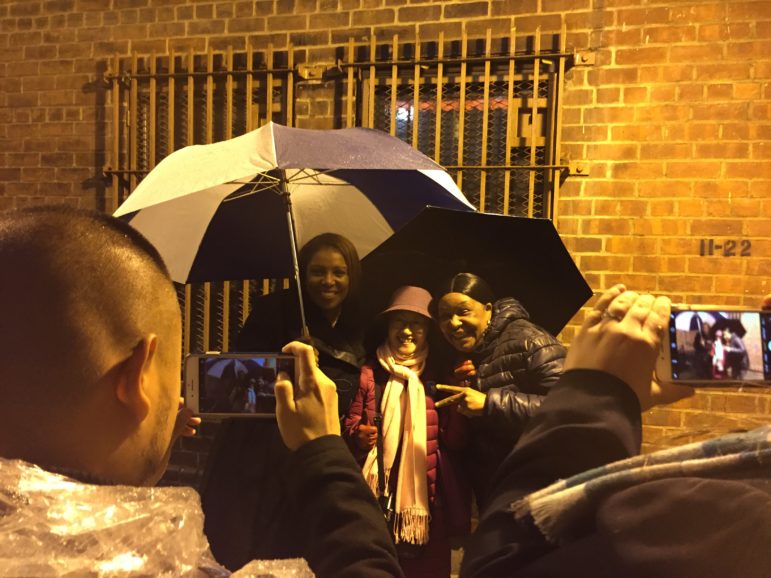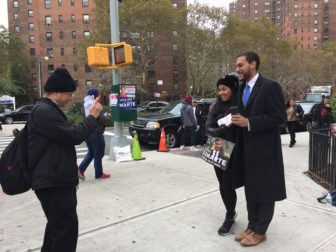
Abigail Savitch-Lew
Councilmember Margaret Chin, Public Advocate Letitia James and another friend pose for a photo outside Hamilton-Madison House on election day, 2017.
On Tuesday, District 1 councilmember Margaret Chin was reelected to four more years of the City Council, though she took only 49.9 percent of the vote.
Her critics divided themselves among three candidates: Christopher Marte, who lost the primary by just 222 votes in September and ran again on the Independence line, took 37 percent of the vote. Bryan Jung, on the Republican line, took 8.8 percent, and Aaron Foldenauer, running on the Liberal Party line, took 4.4 percent.
The race has been regarded as as one of the most competitive this year for a City Council incumbent. Constituents have criticized Chin’s record on a number of development issues, including for not being a strong advocate of passing the entire Chinatown Working Group plan (that would have set affordability requirements and height limits in many parts of the district, including the waterfront where development is now on the rise), for the agreement she reached enabling New York University’s expansion, and for her support of developing income-targeted senior housing at the site of the current Elizabeth Street gardens.
But Marte has faced his own obstacles, having to fend against accusations from Chin that one Marte backer participated in voter fraud, distance himself from a supporting groups’ negative mailer about Chin, and respond to two damaging headlines published this week in City and State: the one published Tuesday said by leasing his campaign headquarters for free, Marte might be running afoul of a campaign finance law (charges the campaign denies).
Beyond her popularity for her eight years of service to the district, Chin also had several key advantages: her identity as an Asian and as a female, both underrepresented on the Council, her possession of the Democratic ballot line, and the strong support of many of her colleagues. (Councilmember Brad Lander, for one, emailed his Brooklyn constituents on Monday urging them to volunteer for “Progressive Caucus stalwart Margaret Chin” who is “facing a tough challenge.”) Her victory was made more comfortable by the surprisingly high level of support for the two lesser-known candidates, Jung and Foldenauer, who took big enough chunks of the vote as to prevent Marte from getting anywhere close to victory.
Marte support in West Village, Two Bridges
Asked by City Limits to describe where he could find his strongest supporters, Marte named Two Bridges, SOHO, Greenwich, and the area of the Lower East Side where he grew up, around Rivington Street and Allen Street.
Marte’s intuition seemed right about the West Village, where the issues of NYU’s expansion and the Elizabeth Street Garden loom large. Of the 10 people who shared their Council pick with City Limits at three polling sites—two surrounded by NYU, and one on Spring Street in Nolita —seven said they were voting for Marte, two for Chin but because they were simply voting down the Democratic line, and one for Aaron Foldenauer.
“She supports development that should not have been supported by someone who’s for the local people,” said one voter, while another with similar complaints specifically mentioned NYU’s expansion.
“I’ve been voting for Chin for quite a while…I actually like her,” said resident Leslie Weeden. She explained she was voting for Marte, however, because “I want to see new blood, young people” and was hoping he’d have a better impact on saving the waterfront and local greenspaces. Affordability was a top concern for Weeden, and she said she understood Chin’s desire for senior housing at the site of the Elizabeth Street garden, but argued that “there are very few spots like that” and Chin might not be “getting the bigger picture.” Similarly, as an NYU graduate she respected the university’s need to expand, but was concerned the needs of the general population of the district needed more attention.
For brain cancer survivor Anthony Ptak, whose son has Down Syndrome, Marte “spoke more to my particular needs”: the candidate had not only showed up to his door twice, and had a good conversation with Ptak about special education and accessibility issues; he even sent a follow-up postcard thanking Ptak for the conversation. “Who does that?” said Ptak, impressed. “That’s crazy, right!”
The person who chose Foldenauer said he was unhappy with development trends, though he said his choice of Foldenauer was arbitrary.
In the Two Bridges area of the Lower East Side, Marte and his volunteers stood outside a poll site about one block from the area where Extell’s tower is currently under construction and four more towers have been proposed. The projects, and whether Chin could have done more to prevent them, have been a subject of ongoing debate.

Abigail Savitch-Lew
Christopher Marte with volunteers in Two Bridges on election day 2017.
Marte said while Tribeca seemed fairly active, Two Bridges seemed quieter. He thought the cold was keeping people home, as well as the fact that it was a holiday for students, but he wasn’t sure how that would affect his chances. A few Latino voters passing by told Marte they’d already voted for him.
“I found out that he was born and raised around this community,” said one Rutgers Houses resident, adding that she had heard Marte was a big advocate for saving gardens and playgrounds, which, she said, were often the casualties of real estate. “I feel like Chin failed by letting them take over Pathmark,” she added, referring to the redevelopment of the local affordable grocery store with a skyscraper a block away.
Later in the evening, when City Limits returned to another polling site in the Two Bridges area, one voter said they’d gone with Chin because of her track record helping people, while the other two said they’d voted against Chin, citing concerns about too much construction, displacement of the poor, and ties to real estate.
Several strongholds for Chin
Around 12:30 p.m., standing with a bevy of volunteers outside Confucius Plaza in the center of Chinatown, District Leader Jenny Low, a Chin supporter, told City Limits she thought that Chin had, at the least, strong support in Chinatown, the Lower East Side and Battery Park (the last because of Chin’s work on resiliency measures). Later that day when City Limits caught up with the councilmember herself, she said that she had supporters in every part of the district. “40 some years, you meet a lot of people,” she said.
But Low’s predictions seemed to hold up. Of seven voters at Confucius Plaza who spoke to City Limits, four were going with Chin, two with Republican Bryan Jung and one with Foldenauer. Shared ethnicity was a frequent determinant.
“She’s Chinese like me. If I don’t vote for her, who’s going to vote for her?” said one middle-aged resident. The Jung supporter said they thought Chin hadn’t been an adequate advocate for the Asian community, but wanted another Asian on the job.
The turnout to Confucius plaza was “fantastic,” in the words of the poll site coordinator. By 12:45 p.m., 392 people had voted.
“This is a huge improvement [over the primary],” said Low. “Our voters are very interested and very concerned about who’s going to represent us.” She cited Chin’s efforts to reopen childcare centers and negotiation for the inclusion of affordable housing at the Seward Park redevelopment, among other efforts. (Chin secured 50 percent below-market housing at Seward Park, but some said she should have pushed harder, for 100 percent.)
At Hamilton-Madison House within the Smith Houses complex, eight people spoke to City Limits and six of them, most of them Chinese, said they were voting for Chin. One praised Chin for helping the elderly and students; two expressed familiarity with her; two relayed negative rumors about Marte, including that he wanted to kick all the Chinese back to China, that he had told lies about Chin’s support for development along the waterfront and, as accused by the Chin campaign, that his campaign tried to scare voters away from the polls on primary day (Marte denies all such accusations).
Of the two who voted against Chin, one was a resident of Knickerbocker Village who complained, “She is only helping her own kind…Everyone else suffers.” The other had voted for Jung because she thought Chin was not sufficiently supportive of her own race.
Not all of Chin’s support came from the Chinese community. Four out of five residents at a poll location on Wall Street went for Chin: two young people because they weren’t familiar with the candidates and had voted down the Democratic line, one because she’d heard good things about Chin though didn’t know much, and a fourth, Sirje Gold, because Marte is “a wise ass, from whatever I can read about him.” She’d heard negative things about Marte that made her feel he was just in it for a career. “Incumbents generally benefit the community” so long as they aren’t there forever, she added. (Another, who feared disclosing her name because she runs a nonprofit and didn’t want a backlash from Chin, said she was going with Marte, largely because of concerns about the Elizabeth Street Garden.)
Marte feels the weather
By the late afternoon, it was not only cold, but also dark and pouring rain. Marte, looking especially tall and somber in his long black coat, stood shivering under an umbrella outside Hamilton-Madison House, while still making an effort to engage arriving voters.
City Limits asked him what he’d do if he wasn’t successful.
“I love to do this. I love to serve,” he said, in a quiet manner. “I’m committed for the long run.”
Chin, dressed in bright pinks, reds, and purples, was feet away; the two campaigns stood side by side in the downpour but did not interact. City Limits caught up with the councilmember while she warmed herself inside Hamilton-Madison House.
“I feel very good,” she said. “A lot of people were voting at every poll site that we’re visiting.” In contrast to Marte earlier in the day, she didn’t think the rain was a deterrent. Asked if she had learned anything from the campaign, she said, “Unfortunately, there was a lot of misinformation and lies and that’s not what democracy is about.”
One of the main campaign points of Marte was that if elected he’d get the entire Chinatown Working Group plan passed. The plan, which would have still needed the approval of the much-resistant de Blasio administration, would have limited heights and instituted greater affordability requirements throughout the district. Asked what her next steps would be on the Chinatown Working Group Plan, Chin at first objected to the continued focus on the matter, then argued, as she has before, that the neighborhood had to move forward with “realistic” steps, including first a downzoning of the waterfront.
Just as Chin was stepping outside, Public Advocate Letitia James, one of Chin’s endorsers (and herself a winner in yesterday’s election) showed up and the two female officials greeted each other jubilantly and posed for photos in front of their volunteers, seemingly assured of their coming victory.








